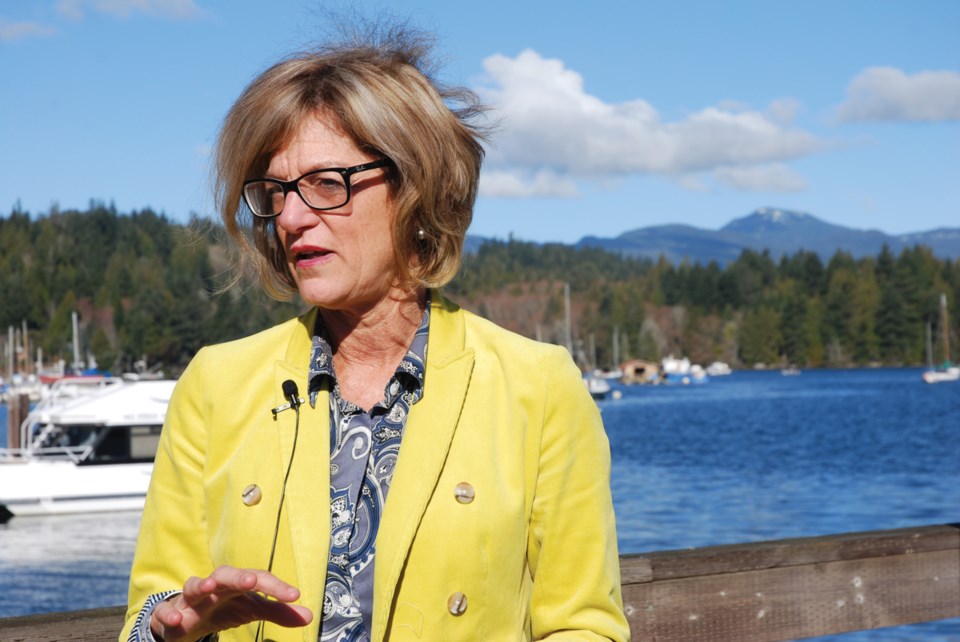A new approach to regulating salmon farms in B.C. will mean aquaculture companies must have support from First Nations, but won’t require them to end open-net farming.
Agriculture Minister Lana Popham called the new regulations straightforward. “Effective June 2022, the province will only grant tenures to fish farm operators that pass two tests. One, they must satisfy the federal government that their operations will not adversely impact wild salmon stocks. And two, they must have agreements with First Nations in whose territories they propose to operate.”
Following a 2009 Supreme Court ruling, the federal government has had control over fish farm licences and regulates the industry, but the province still has authority over the tenures needed for infrastructure on the foreshore, docks and pens.
The opposition Liberals said the new rules will create uncertainty in the resource sector, and accused the government of “changing the rules to appease their activist friends,” in the words of the party’s environment critic, Peter Milobar.
Wednesday’s announcement is the latest in a series of recent developments on the aquaculture file.
In a letter published in Coast Reporter and several other B.C. newspapers this week, West Vancouver-Sunshine Coast-Sea to Sky MP Pam Goldsmith-Jones argues, “It is time to transition British Columbia’s open-net salmon aquaculture industry to closed containment.”
Goldsmith-Jones said the federal and B.C. governments should move forward with “a regional approach to aquaculture in Canada and to explain how we plan to transition to closed containment on the West Coast of British Columbia.”
In its election platform, the NDP said it would “provide incentives to help the aquaculture industry transition to closed containment where possible.”
Last week, the NDP government announced the creation of a Wild Salmon Advisory Council and a change in the terms of reference of the legislature’s Standing Committee on Agriculture, Fish and Food that calls for it to make recommendations on “how to restore healthy and abundant wild fish stocks,” a task that will likely include looking into fish farms.
Powell River-Sunshine Coast MLA Nicholas Simons sits on the committee, and he spoke to Coast Reporter before the tenure announcement.
“What we’re trying to do is engage First Nations and the federal government to be able to provide their input and have more say in the industry than they do now,” he said.
Simons said he thinks many of his constituents support a shift to closed containment. “I’ve been hearing quite a bit from people who are interested in us taking a stand against any expansion [of open-pen fish farms] and in favour of closed, on-land structures.”
Simons also said he meets regularly with industry representatives in the riding.
According to the ministry, there are 10 fish farm tenures on the Sunshine Coast, including Powell River, but one is inactive. Most are for farms operated by Grieg Seafood in Sechelt and Jervis inlets.
Rocky Boschman, the managing director for Grieg Seafoods BC, said the industry has studied closed containment, which would involve the same technology already used in their hatcheries.
“We drive technology, so we embrace any new idea that will improve our business,” he said. “It’s just a matter of when does the business case justify moving more of that production onto land… Modern open-pen salmon farming has the smallest environmental footprint of any type of animal food production in the world.”
He also said when considering a move to land-based aquaculture, it’s important to weigh the footprint a large-scale farm would have because of power needs, land clearing and access to groundwater.
“This is probably something the public wouldn’t appreciate.”
Boschman said at this time the company is not concerned about the future of any of its tenures.
He also said he supports the work of the new Wild Salmon Advisory Council. “Anything we can do to protect wild salmon is good… Everybody in the salmon farm industry is totally on board with doing everything we can to put wild salmon first.”



